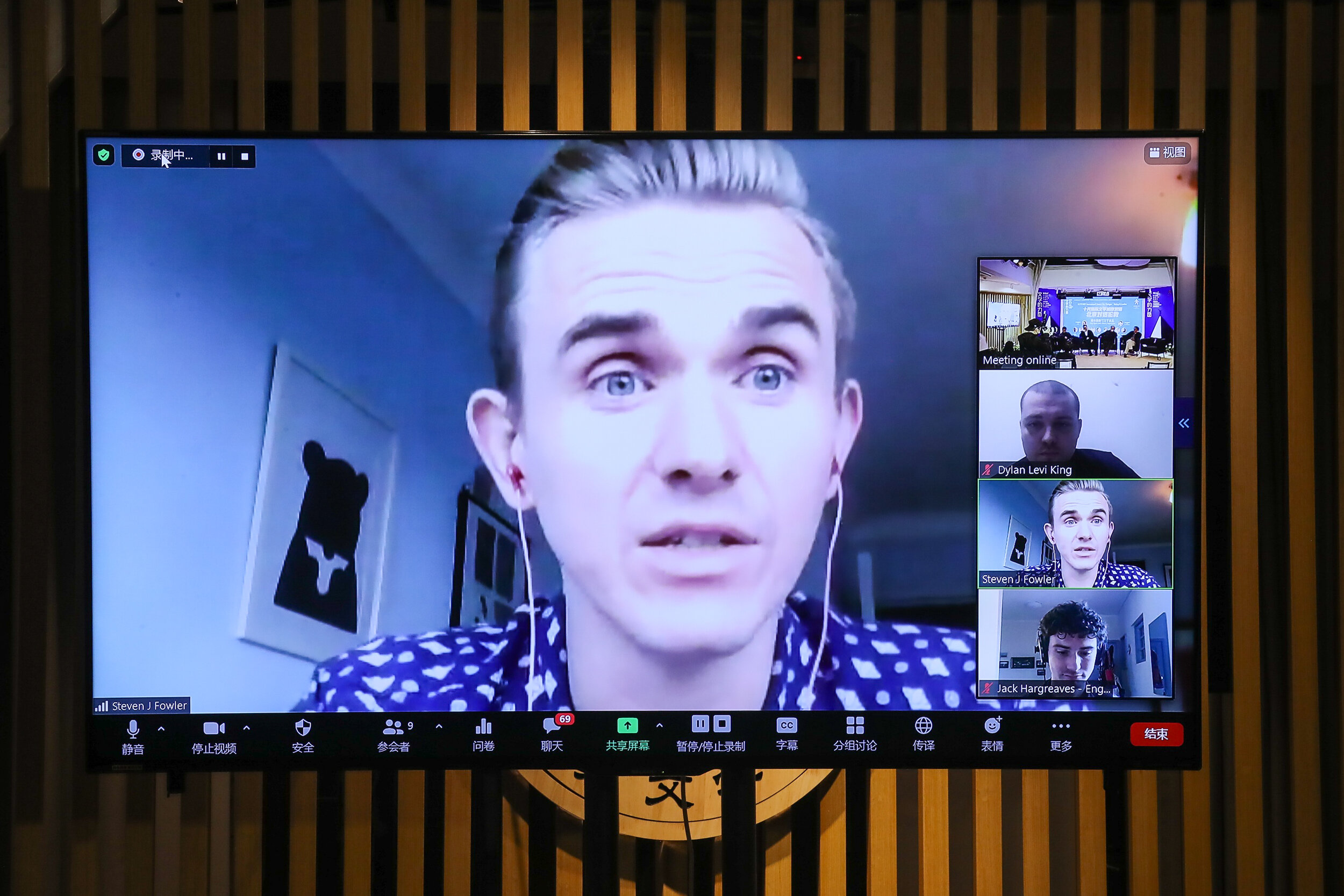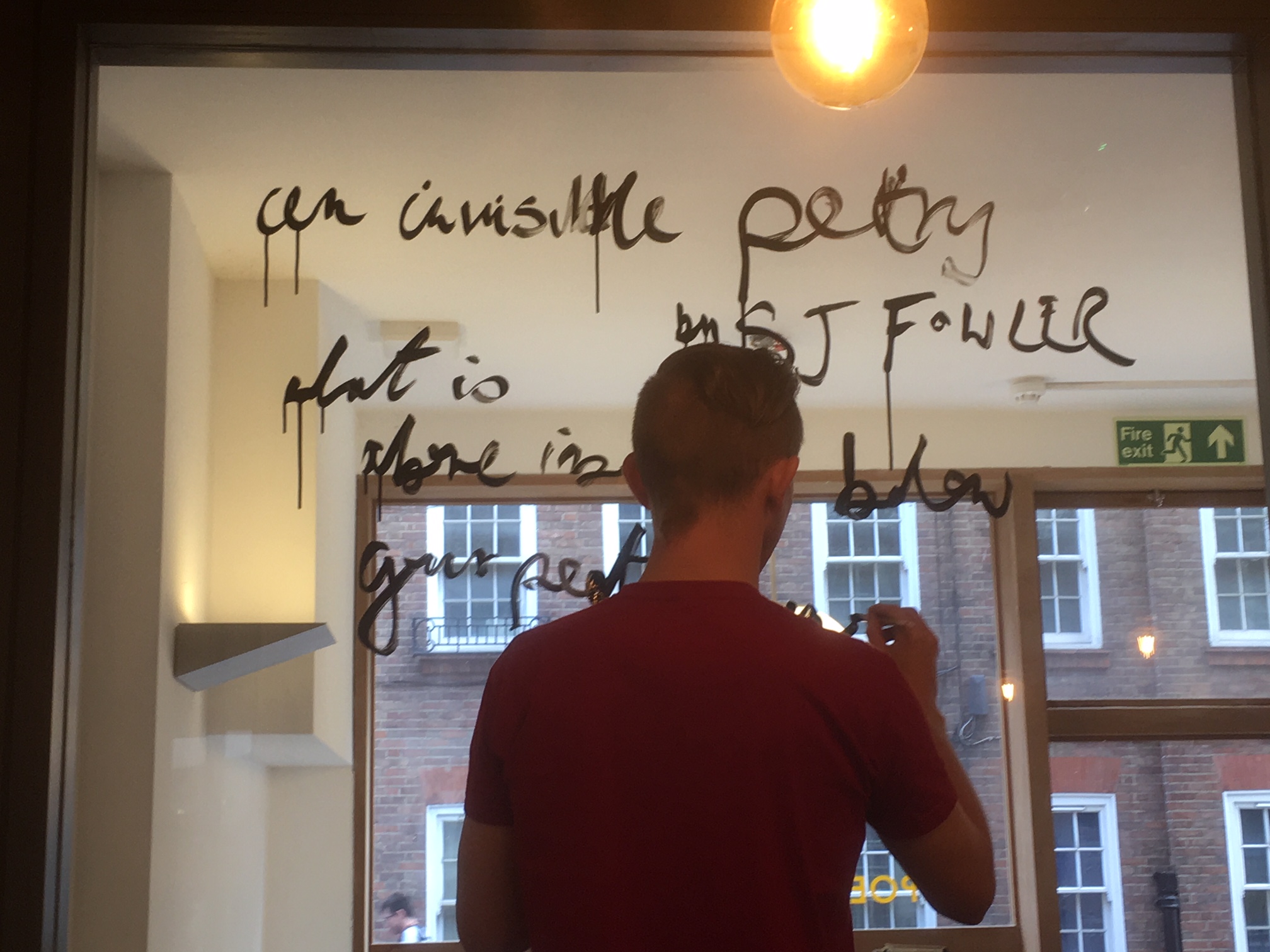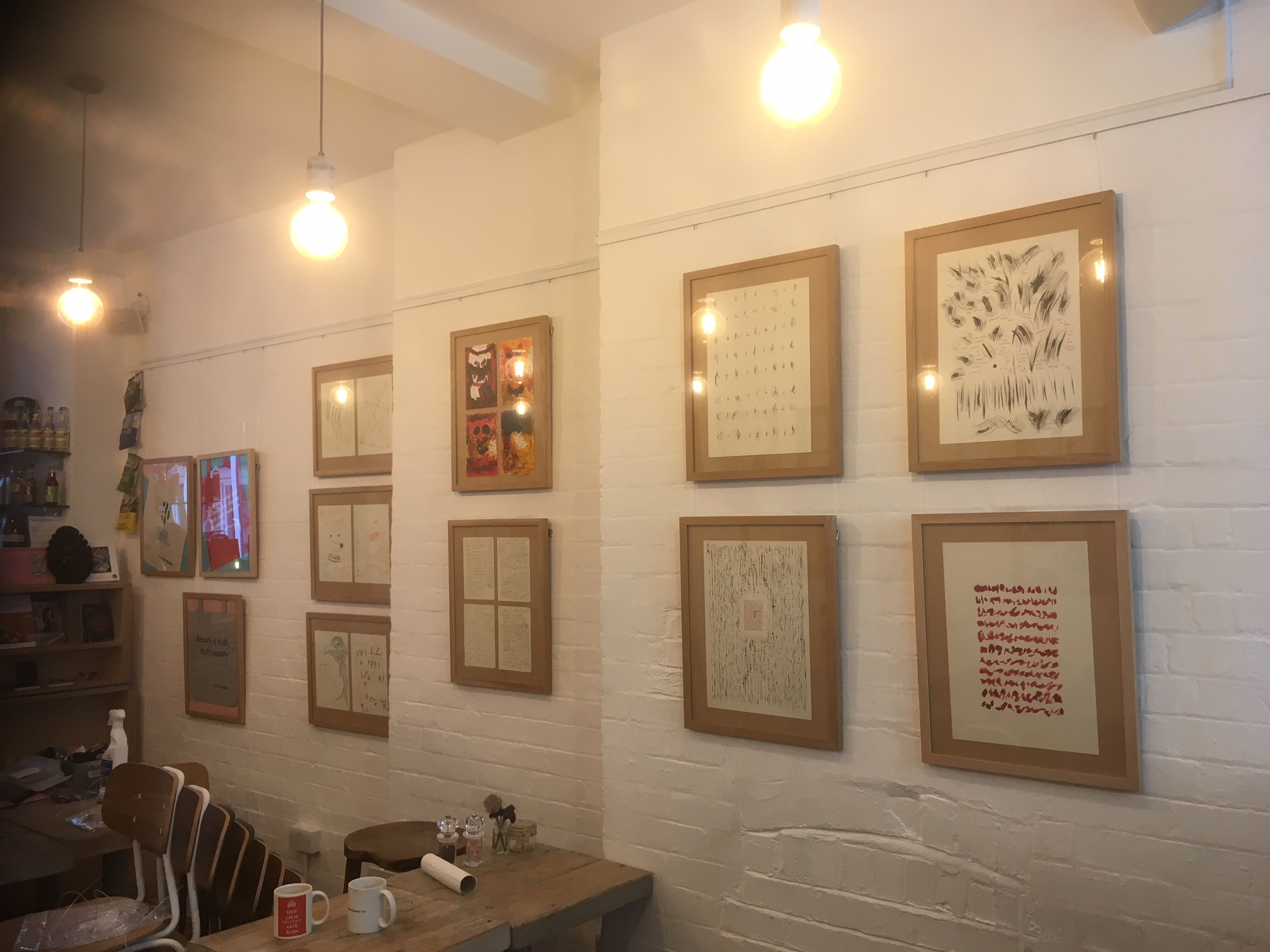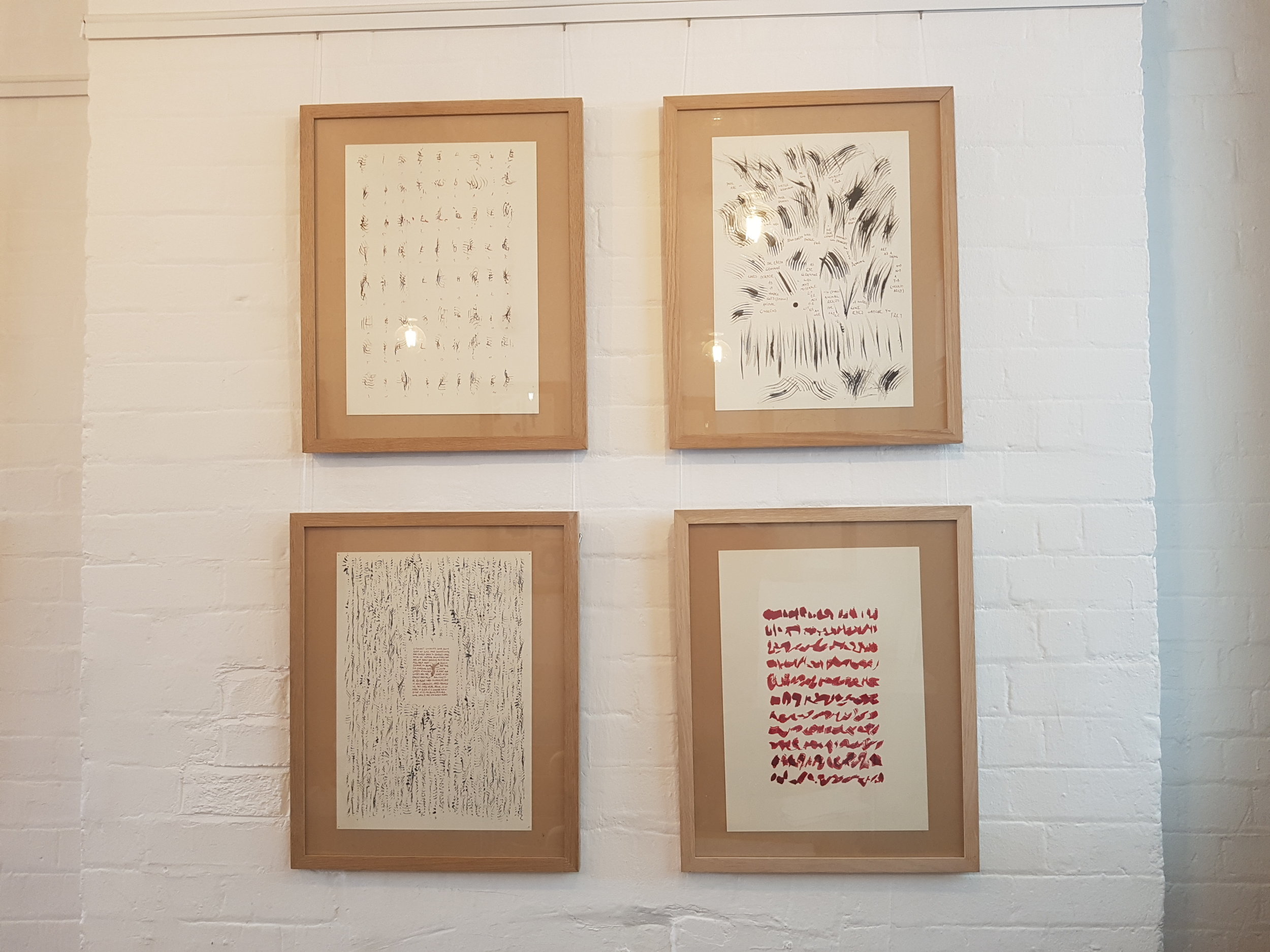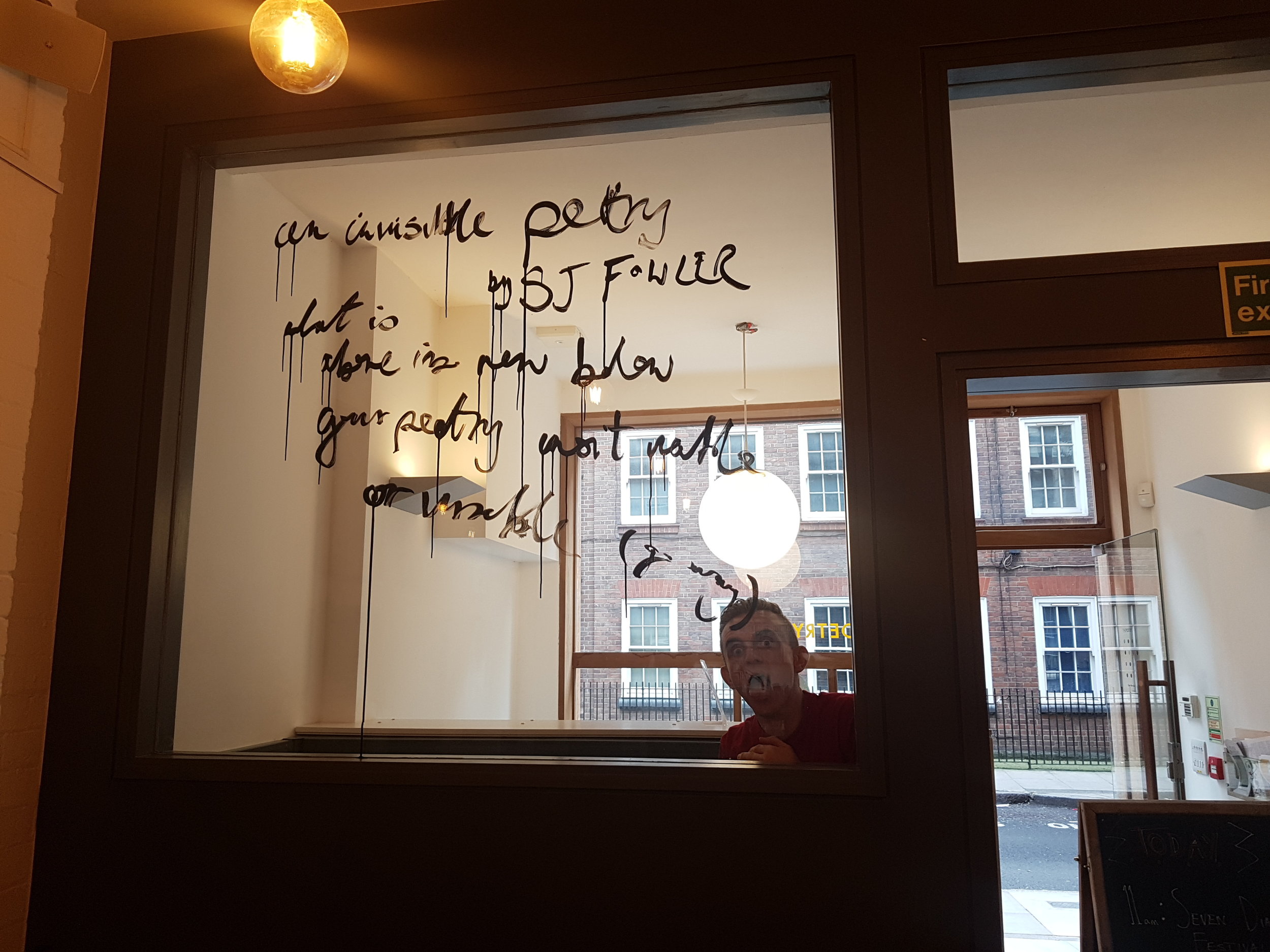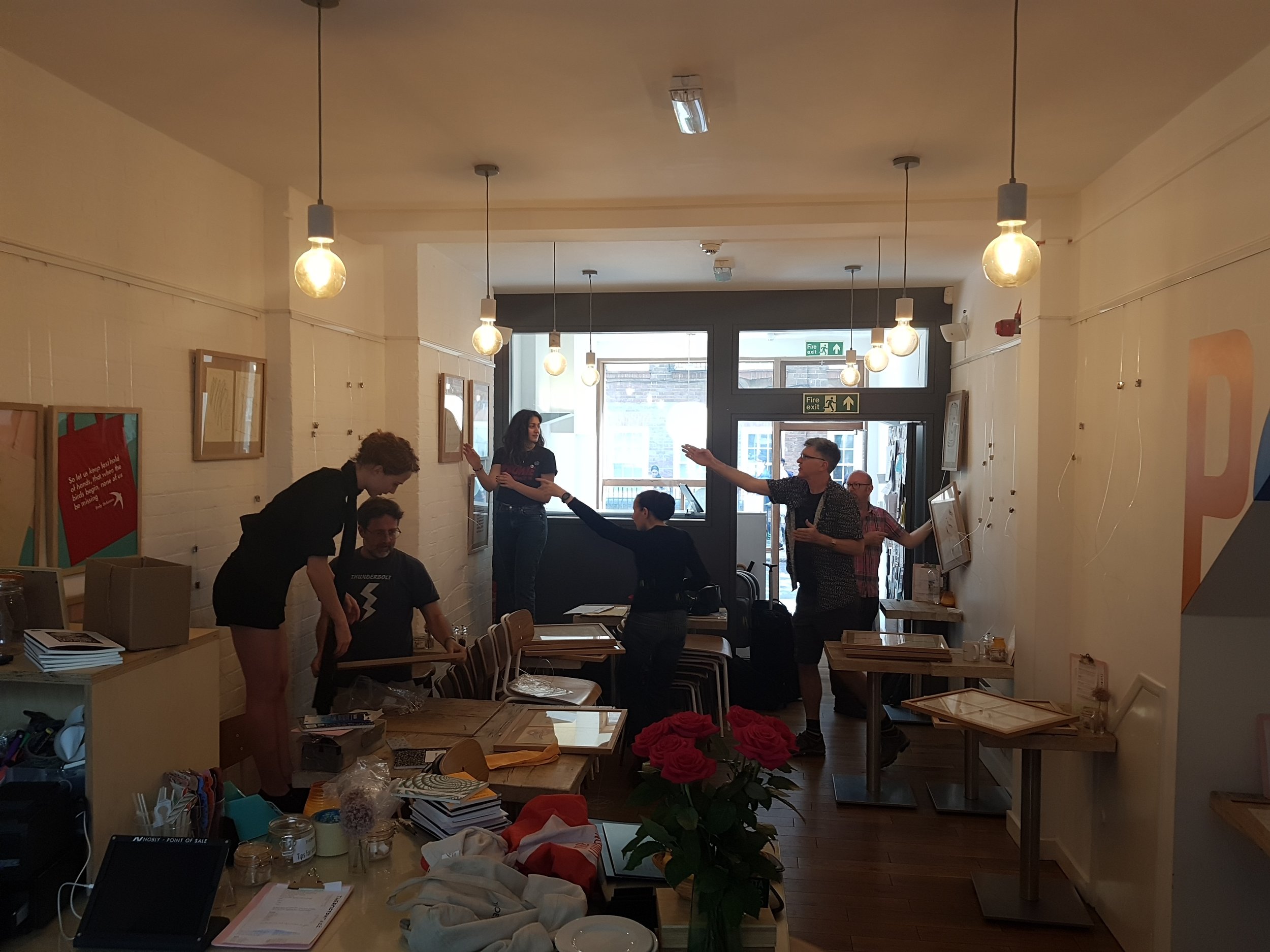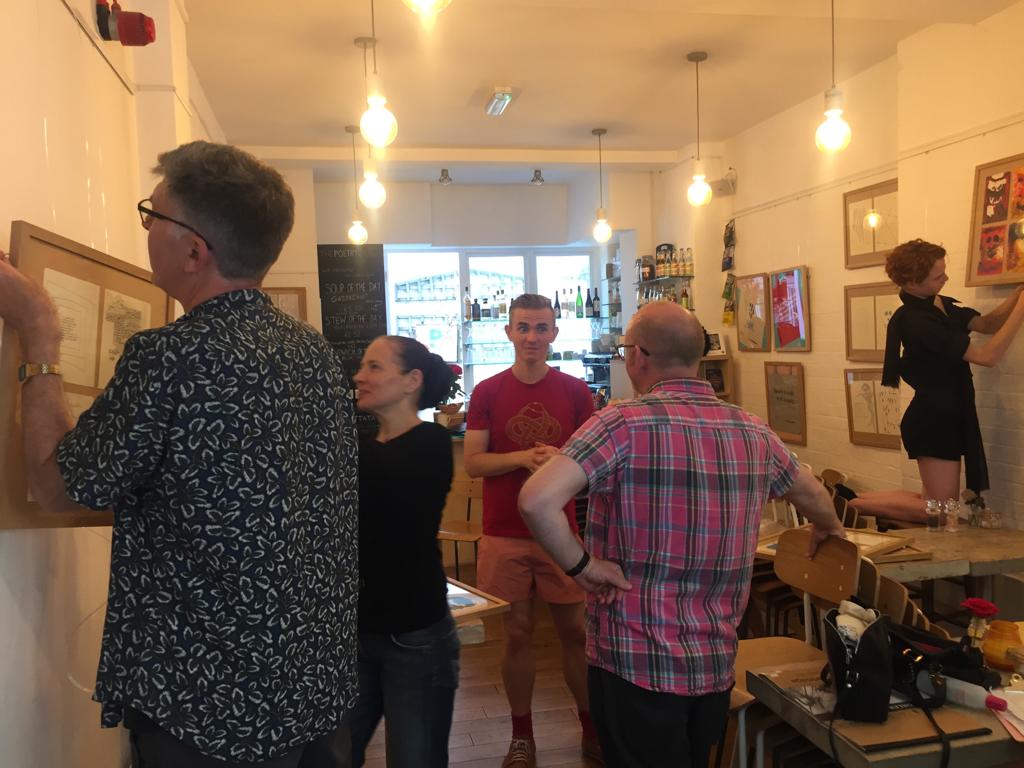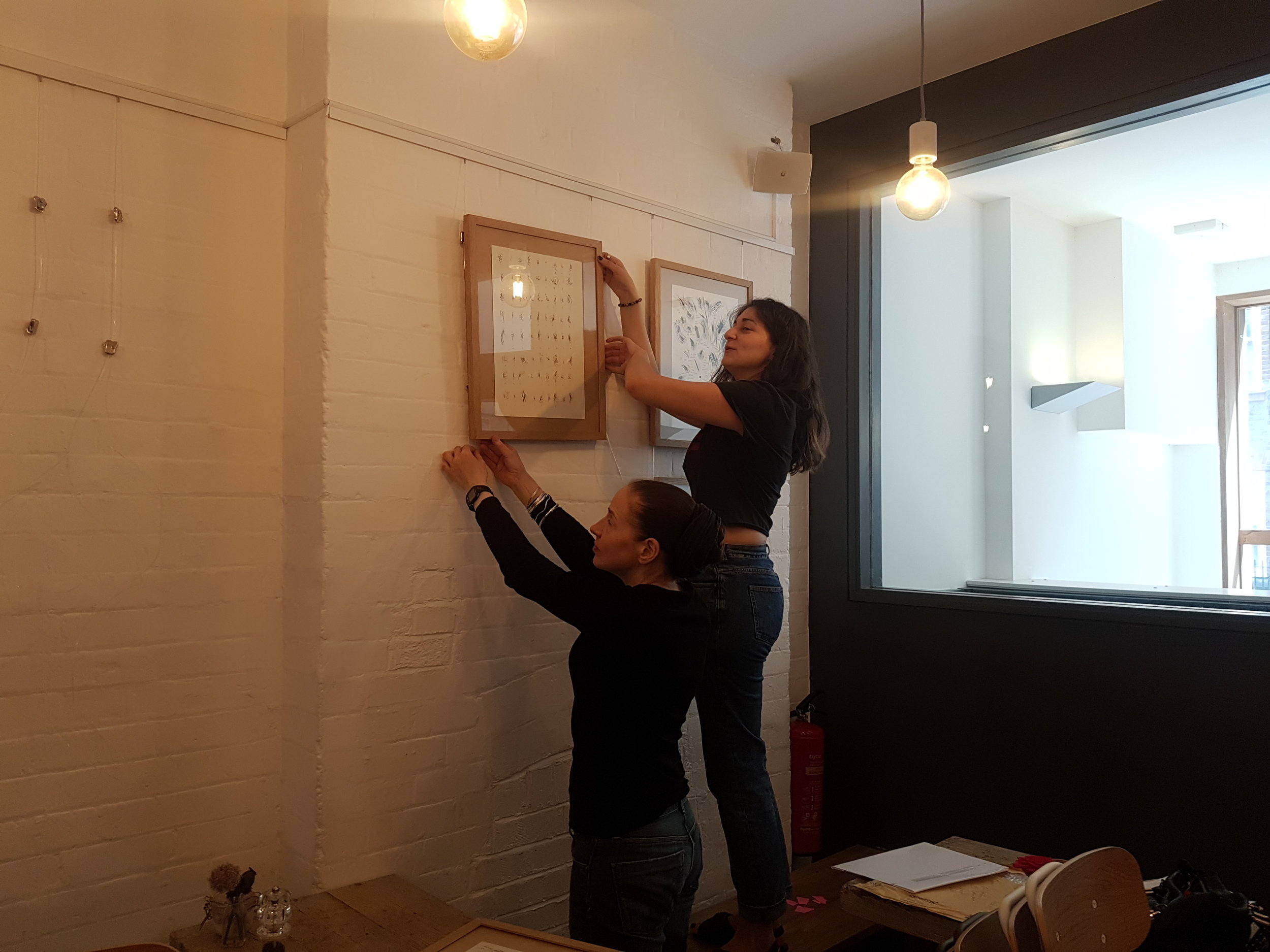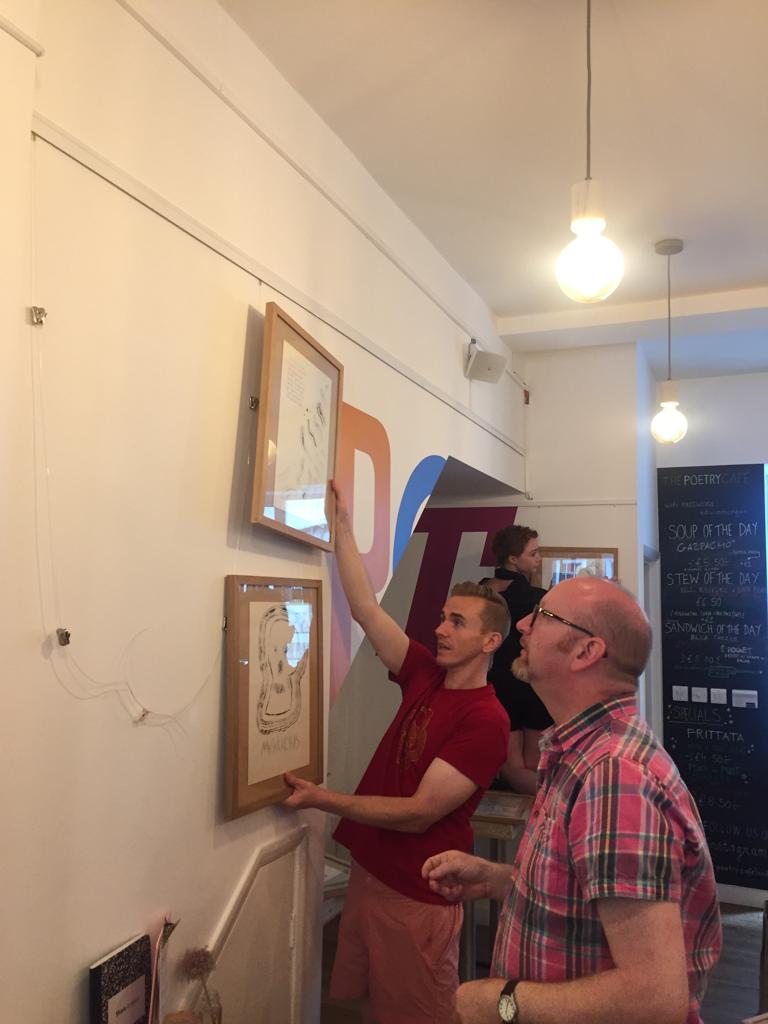I had such a lovely time being part of The Beijing October Literary Festival online recently. I had the pleasure to visit and read in Beijing in 2016 and made friends there who remain correspondees to this day and so this was, for me, a reconnection. The online festival has two themes - the city and tradition with modernity. I gave a talk on London, on its relationship to my writing, reflecting on how physical space, proximity, alters the reality of the writer, and how the modern city demands a modern literature, that looks forward, future facing, rather than looks to history for writing. History is for history. It seems to go down well, which was gratifying, but for me, the other speakers were exceptional and this was arguably the best online event I’ve done. It was especially cool to watch the Chinese poets and writers talk about Beijing and the modern Chinese megacity. It was a frank and playful conversation at times.
A note on : Poem Brut phase 3 and Hawkins at Second Step
Poem Brut is entering a third phase. I began the project hoping my approach would create a nice series of events. I wanted to promote poetry methods that engaged in their context, innovatively, in a contemporary way, with the handmade, the visceral, the visual and the live while also asking what effect our brains have on our writing. I wanted to include knowledge from those with alternative cognitive experiences. But I didnt want to make them definitional. I didn’t want to advertise it, or make the project about ‘outsider’ poetry, or people’s bio. This is all seems to have worked. I’ve had emails over the lockdown asking me about the ‘movement’ of Poem Brut. It’s a bowel word but that’s nice that people see the project as a thing.
Our first phase was events and publications. Our second was about continuing that energy, including exhibitions and then commissioning and mentoring individuals who are often left out of that kind of stuff because they are so original. In both cases the open submissions of our 3am series kept the people involved ever changing, growing, open minded and open doored.
This third phase, planned for 2021, will continue all these activities, but go further in helping poets branch out with their own projects. A brilliant example of this is the incredible teaching work of Paul Hawkins at the Second Step mental health charity in Bristol. Paul has done an amazing job sharing Poem Brut work and ideas to people using Second Step’s service. You can read about that here https://www.poembrut.com/secondstep and the tweet above says it all. / More coming soon on Poem Brut in the new year, when hopefully we are all able to meet again in person.
A note on : An Invisible Poetry - my solo show at The Poetry Society
An Invisible Poetry : SJ Fowler The Poetry Society Cafe
July 1st to 27th 22 Betterton St, London WC2H 9BX
Opening Hours 11am to 10pm everyday bar sunday.
poetrysociety.org.uk/poetry-cafe/exhibitions/future-exhibition/
A pleasure to have my third solo exhibition (I’m actually really happy with it) in London take on the walls of the Poetry Society in Covent Garden, in their Poetry Cafe. The exhibition brings together new and existing poems, drawing together my explorations in the hand-made since late 2017.
Waaaay more info www.stevenjfowler.com/invisible
“A visual poem should be visible, yet it seems it’s often not so. In this solo exhibition of new painterly poems, SJ Fowler asks questions so manifest they are almost indiscernible. What is in the shape of a letter and what images do words recall?
A note on the installation of An Invisible Poetry : June 30th 2019 On the morning of June 30th, installation day, early on a sunday after the hottest day of the year, the poets who are kindly contributing to the Poet Brut group downstairs, friends and peers, were not only gracious and kind in the setting of their show, but immensely helpful with my own. They stayed for hours helping me create it, truly. For I am terrible at installations and such things, I rush them and cannot judge spatial meaning without falling into the desire for it to be deliberately messed so viewers think it accidently. The eyes and hands of Astra, Simon, Vilde, Patrick and Imogen made what should have been a chore into a really fun experience. All of this was really underpinned by the hospitality of Michael Sims, of the Poetry Society. He really deserves great praise. He could not have done more to help and facilitate ideas and offer advice. He made me feel my work was welcome in the space, and the institution, which isn’t a small thing.
Published: Versopolis Poetic Articles #2 - Animals as Humans, can only monkeys laugh?
The second in my series of articles that are prose poems that are anti-opinion / anti-conclusion / anti-journalistic. It’s an interesting challenge, a long form poetic reflection, for an English person anyway. This one, following the theme of Drugs, is on the theme of Animals.
https://www.versopolis.com/times/essay/730/animals-as-humans
“Things obviously to be regretted in the future. The way humans educate their children. The way humans treat and consider their own planet, their own environments, their own place. The way humans treat and consider animals, as meaningless, stupid, brainless nothings. As food, to be made and unmade for a belly that might be full of whatever it likes.
What the bloody hell is this massive weapon? It protects us, splits us homidiae from the pan pongo interface. Yet we cannot know each other’s self-consciousness, let alone that which lies in the grey brain of other creatures. A funny assumption begins a history.
The octopus compared to the human. The chimpanzee compared to the human. The otter compared to the human. The bear compared to the human.
The human glad in misadventures, harsher and more ravenous than anything you ever heard, anything in all other creatures born days.
Dogs. That perpetually dogs the footsteps of humans. Dogs as a verb. Dogs a best mate. Dogs as a fetching machine. Dogs who need defending. Dogs who defend homes. Dogs eaten in China, South Korea, Vietnam, and Nigeria. “
A note on: Illumations - Thomas Bernhard at Austrian Cultural Forum
]another grand entry into this event series i'm lucky to be curating for the austrian cultural forum, this time celebrating thomas bernhard, an author who has always been important to me, seeing the world as it is, and not the plastic rendition of optimism that creates an opposite feeling in the hearts of those with their bloody eyes open.
The lineup was really stellar, I got to work with the amazing Maja Jantar once more, and the equally inspiring Tereza Stehlikova, and discover two visiting austrian poets, Raphaela Edelbauer and Sophie-Carolin Wagner, who i had naturally researched but never seen perform live.
as ever what the artists do in these events, recreating the authors in question through such innovative means, is inspiring, and the ACF couldnt be cooler to work for http://www.theenemiesproject.com/illuminations
A note on: English PEN Modern Literature Fest III was a grand night
The third time I have curated this mini-fest alongside / for English PEN, whereby contemporary English writers present works written in tribute to a writer who is part of the Writer's at Risk programme, writers living under oppression around the world. http://www.englishpen.org/ This time we slightly scaled down the rather grand one day festivals of past years, bringing it to Kingston and the historic All Saints Church, as part of my Writers Centre Kingston programme.
8 authors presented pieces of writing, some new, some from past years. The spirit was one of considered celebration, of sadness, in places, of frustration, but moving beyond the somewhat stifling requirement at the heart of the event, asking authors who are generally safe and sound to speak about those who are not, and who are not because they chose, in most cases, to refuse silence. This contradiction has often led to overloading, with writers unable to express themselves, stopped up by a kind of shame. But in a more intimate setting, with a group students, volunteers and local people watching on, this felt more like a community taking note, making sure there was something, instead of nothing, to mark out those suffering were being thought of. All the videos are here https://www.youtube.com/channel/UC2LmXtC6HArB9k2QSLWQGJA/videos
A real highlight for me this year is that it spawned Kingston University's first Student PEN Centre, led by Alan Boyce. I'm happy to say this relationship will continue and next year's English PEN festival will be just as good I'm sure.
There's a nice report of the event here too, by Tice Cin https://www.englishpen.org/campaigns/english-pen-modern-literature-festival-2018/
They event featured MONA ARSHI FOR ZEHRA DOGAN / TONY WHITE FOR AHMED NAJI / HELEN PALMER FOR ME NAM / SARA UPSTONE FOR DAWIT ISAAK / ADAM BARON FOR CAN DÜNDAR & ERDEM GÜL / PRUDENCE CHAMBERLAIN FOR PATIWAT SARAIYAEM & PORNTHIP MUNKHONG / ELEY WILLIAMS FOR TSERING WOESER / DAVID SPITTLE FOR AHMEDUR RASHID CHOWDHURY
Writers poets, novelists, playwrights and artists come together to continue English PEN's relationship with innovative contemporary literature. Each of the ten British writers will present poetry, text, reportage, performance on the day. The new works celebrate and evidence the struggle of fellow writers around the world, in solidarity.
The event is intended as a call to membership for writers, artists and readers in a time where we face perilous challenges to our freedom of expression and fundamental rights and hard fought liberties, both internationally and here in the UK. As the world changes so remarkably, and so rapidly, and on a global scale, it is vital the political will of our time and this generation of young, dynamic writers is directed purposefully to the work of English PEN, the writer's charity. The hope is this festival, away from creating new members of PEN, begins involvements and connections which will have exponential resonance for decades to come. www.theenemiesproject.com/englishpen Curated by SJ Fowler and Cat Lucas.
Please join English PEN You can join English PEN here http://www.englishpen.org/membership/join/ and if you are a writer, poet, artist, or someone who is passionate about defending our fundamental freedom of expression in the UK and around the world, please take the time to do so and become a part of the future of this extraordinary organisation.
A note on: montage from European Literature Night, Amsterdam
From a lovely night at Brakke Grond in Amsterdam, when I was chatting about the idea of home with the brilliant Rasha Abbas amongst many European poets. Thanks again for all involved and the british council. More here www.stevenjfowler.com/epn Also Im in this vid for like 2 seconds
A note on: European Literature Night : Amsterdam - May 10th 2017
A brilliant few days in Amsterdam thanks to the British Council and the myriad folk behind Amsterdam's ELN. A city I love, a cousin to my home London, with friends abounding in poetry, decent, serious poetry folk. I arrived and rolled right into the amazing Lloyds Hotel, one of the nicest places I've ever stayed, a cultural venue and landmark in and of itself before going to the Brakke Grond venue and meeting the 10 others writers who were part of the night. Guido Snel curated and moderated the evening, placing small groups of writers together, each of whom would have a discussion panel on the theme of home. An essay was commissioned beforehand, translated into Dutch and published in Erik Lindner's Terras magazine. I was paired with the Syrian writer Rasha Abbas. Naturally her conception of home was so powerfully juxtaposed against my own but we had both written in similar ways about the concept, so we were paired and it was the best thing could've happened. She was magnificent, darkly funny, generous and deeply intelligent. We had a really energy in our conversation on stage, to a sold out house. She read some of her diaries, about her arriving in Germany after leaving Syria. I talked about London being the only home I've truly felt I've had because it is populated by those who are not at home there and therefore at home in that sense of being without a home. I also talked about my own background, Englishness, paradoxes, semantics, and together we worked up some fine ideas while the artist Sarah Yu Zeebroek live illustrated it all. More at stevenjfowler.com/epn
The next day, a full day I had given myself in the city, I was interviewed by Mylene van Noort of Lloyds Hotel and cultural embassy, getting the most hospitable welcome, with a tour of the incredible rooms, all of which were designed by artists and tie into the building's storied history. Then I explored the city, the highlight of which was a tour of Perdu bookshop by Frank Keizer, a fine poet and a hub of experimental poetry action in the city. A beautiful few days. https://www.brakkegrond.nl/en/agenda/eunic
A note on : European Poetry Night Norwich 2017
As part of three days of European poetry celebrations last week I had the pleasure of accompanying four Scandinavians poets to Norwich, to read at an event I organised, which also drew in local Europeans, in the camarade model, in pairs. The night was brilliant, full of energy and warmth. I met lots of poets new to me, and reconnected with many friends. We had a grand turnout thanks to the Nordlit seminar on translation which had been taking place that day, hosted by those who had kindly hosted us, Writers Centre Norwich and the International Litcase Showcase. http://www.theenemiesproject.com/norwich
I collaborated for the fourth time with Ásta Fanney Sigurðardóttir. We’ve only known each other for just over a year, but our collaborative magic feels many years deep. We put on a kind of Eurovision Poetry Contest, or hosted something to that effect. As ever, Asta’s rare energy and invention told, it was a weirdly beautiful piece of poetry theatre.
We were shown great hospitality too, with Dan, Endre, Martin, Asta and I taken to dinner, and then out on the town for many hours after the event. Always wonderful people to work with, Jonathan Morley, Sam Ruddock and everyone involved made sure the beginning of EPN was memorable.
A note on: after the second English PEN Modern Literature Festival
An extraordinary day at Rich Mix, surrounded by around thirty poets and artists, the remarkable staff of English PEN, a handful of volunteers and all told, over a few hundred people watching on. I arrived around noon, to soundcheck and set up the theatre space where the performances would take place, and i left the building, conversations still beginning and growing behind me, around eleven hours later. Exhausting, physically, of course, but resonant in every way, from the originality and range of approaches to the deliberately overwhelming task facing the English writers, to the evocation of those we were celebrating, always somehow present, both comforting and confrontational to ourselves.
This last part cannot be escaped, and again, as last year, it did fold in on some of those presenting their work. More than once it was said into the microphone, 'I couldn't write poetry about this', or something to that effect. With this I respectfully take issue. Indelicacy, obstinacy, clumsiness - these are at work whenever some experience in the world is rendered in words, always failing to grasp the thing, always lessening. It is not true that someone's sacrifice or pain when reflected upon in text is made worse. It is true that bad poetry will perhaps, lightly, do this, seem insulting to the profundity of the thing it seeks to literally describe. But no one in this festival thinks with such formulaic reduction and for the most part the work that was shared was most powerful when oblique, evocative, strange, menacing and beautiful in its idiosyncrasy. We had Chloe Spicer for Dina Meza, with her imaginary cut out friends, bounding into the audience, Hannah Silva for Narges Mohammedi building a soundscape around her poem, Kate Wakeling knotting for Nurmuhemmet Yasin. We had Nelson Aguilera's son in the audience, approaching Jeremy Noel Tod just before he began to present a piece for his father. All the performances can be seen on the site here http://www.theenemiesproject.com/englishpen and I would urge a perusal of this resource, it carries some of the spirit of this very special, very intense day.
It almost goes without saying that I hope this happen again, the second festival becoming a tradition in the third. At times one feels hollow, that it is just this, a day of removed solidarity. But this doubt must be expected, embraced, pushed aside, and when Tony White presented his marvelous dialogue with Ahmed Naji, he said what I, deep down, had hoped to hear. He said though it might feel like what you are doing makes no difference, when the writer a continent or ocean away from you, facing censure, oppression and pain, hears of you mentioning them, celebrating them, thinking of them, it gives them great heart. I wish for no more, ever, from any work I should do. From giving another human, if only just one, if only for a moment, an inflection of solidarity, warmth, courage, I am myself encouraged to keep up the little this festival is.
A note on: Performing at York Literature Festival
An exceptionally resonant time in York, thanks to the hospitality and curation of Kim Campanello, York St John University and the York Literature Festival. I love the city, having visited a lot as a kid, with viking familial roots, in the stink of the Jorvik centre, and having been there just months before for the NXNW tour. This time just Antony Dunn and I performing at a showcase event, the audience was amazing, the students brilliant, the whole impact of the event rare and memorable. There was a sense of juxtaposition in the event, between Antony as a poet in the lyrical tradition and me in the more experimental, but that proved not be conflicting but generative. Similar people with slightly different experiences and tastes in poetry. It created something valuable, something to riff off against. Antony was brilliant to watch read and to chat with in the Q&A, and I thoroughly enjoyed auctioneering for the first time, as well as book eating for perhaps the third.
They collected some feedback from the audience, quite enjoyable to read.
'Fantastic event, thoroughly enjoyed'
'Loved the contrasting styles'
'Polar different takes on poetry and yet shared values'
'Love Dunn's poetry about the everyday and Fowler's combining of words and other media'
'Brilliant to witness these poets up close and their eclectic personalities. Very inspiring.'
'Performative nature of both poets was eccentric and exciting'
'Cheered me up!'
'I got a free poem [he didn't eat the whole book].'
'Didn't like book-eating, but appreciated SJF's reason given for eating book.'
'Perfect pairing of poets'
'Brought to life the poetry and contextualised it within the world'
A note on: curating the 2nd English PEN Modern Literature Festival
Such was the resonance and enthusiasm around the first, the second had to come. It feels as though this is the beginning of a tradition. I hope so. There isn't another curatorial activity that has proved to be this engaged and purposeful for me. Once again my role really is to liaise between the brilliant, principled, pragmatic work of those at English PEN, again working closely with the inspiring Cat Lucas, and the thirty writers who have agreed, all of them with great willingness and humble trepidation, to write or perform a new work on April 1st, in service of another author.
Once again my experience was to spend time with authors around the world whose deliberate acts of decency, whose ethical drive, whose fundamental character, has led them directly into the kind of psychological and physical harm that leaves one weaker for knowing of it. To spend such brief time with these people, these peers, and to know in that trifling moment how little I can know of what they and their families are experiencing because of their writing, their journalism, their poetry. And so the English writers have expressed again this feeling of overwhelming responsibility. One so overwhelmingly as to be perhaps prohibitive. And for all its remarkable energy and galvanising intensity this is the one thing I have learnt from last year and that I have tried to pass on to this year. This magnitude is implicit. The authors from England should not apologise for their own fortune and comfort while celebrating the courage of another. They should celebrate them, write for them, to them, with them. They should be as modern, as experimental, as humorous as they are grave. They should take their responsibility to be in the investment aesthetically as well as emotionally. This is not a small detail. It is vital. Because by doing the day itself, by making something where perhaps there would be no connection between two writers across the world, that sense of shame, in a small way is being acknowledged. From that moment on, we must just have them in our minds, spread the word of their work and their actions, keep things alive.
Some extraordinary writers are involved this year, you can see the full list below or on www.theenemiesproject.com/englishpen. The event is free, in three parts. What I hope happens is what I hoped for when we initially hatched the idea. Nothing impossible, nothing utopian. The create more members of English PEN, so that the political will of this time is directly forcefully behind the writers charity, who have the expertise, who are on the front lines of absolutely vital battlegrounds in our time, from surveillance to free speech, while also being a light in the dark for many writers abroad, thirty of whom we will celebrate on April 1st.
A note on: Lightwave: New Performance in Lithuanian Literature
Wednesday March 15th / 6:30pm doors for 7pm start / Free Word Centre
60 Farringdon Road. EC1R 3GA : Free Entry but online booking requested here
A unique event celebrating Lithuanian’s new generation of literary artists, featuring brand new readings and performances by Gabrielė Labanauskaitė-Diena, Žygimantas Kudirka and SJ Fowler, a British poet connected to their innovative, collaborative practise.
Both Labanauskaite and Kudirka have carved out reputations across Europe for remarkable writing and live performances to match. This is a rare chance in London to witness poets who are breaking ground in the new European scene.
From Lithuania’s powerful lyrical and formal tradition has grown a culture of experimentation and in this event curated for the London Book Fair, the Lithuanian Culture Institute brings to light the best of Lithuania’s new generation of poets and performers.
Speakers Žygimantas Kudirka is a writer, artist and performer of interactive poetry, artificial languages and electronic music. Kudirka’s first poetry collection, XXI a. Kudirka (The Twenty-first Century Kudirka), is made up of interactive verses, literary remixes, internet poetry, and texts of unusual graphic forms and content. He is also a performer of avant-garde rap and one of the pioneers of poetry slam in Lithuania, representing the country in European slam poetry championships. His works have been translated in different languages and part of them can be found online here, here or here. / Gabrielė Labanauskaitė-Diena is a text producer. She combines poetry, drama, essay and other texts with interdisciplinary arts, enjoying her roles as writer, performer and organizer. Gabrielė also appears in classical forms – as a playwright in theatre, lecturer at Lithuanian Music and Theatre Academy, human being in everyday life. Find out more here and here.
A note on: York Literature Festival - March 29th
Very pleased to be reading at York Literature Festival on March 29th, launching my new book The Guide to Being Bear Aware, and reading alongside Antony Dunn, in an evening curated by Kim Campanello and York St John University. Details here http://www.yorkliteraturefestival.co.uk/event/contemporary-british-poetry-sj-fowler-antony-dunn/ It's a very impressive programme overall, if you're in the area, please come along.
Published: an article of "The Poetry Reading, Literary Performance & Liveness" for Norwich Writers Centre & ILShowcase
http://litshowcase.org/content/reading-in-public-is-always-a-performance/
"READING IN PUBLIC IS ALWAYS A PERFORMANCE
SJ Fowler explores the role of poet as performer and artist
Cautiously declaring a desire to be severed from the tendon of smugness often associated with the avant-garde, be it in writing or performance, I will begin rather by saying my interest in this kind of writing is really not about literature first, but about three things, two of which seem relevant to the notion of liveness and poetry.
The first is the future – a desire to be future facing, in a moment where the world is so different than it ever has been before, so much so that it is beyond previous imagination. By this I mean the world population of human animals doubling in the last forty years, climate apocalypse, the internet as a language based human nervous system emerging in the last three decades etc… No more on this, but to me the avant-garde gives poets more in the way of preparatory strategies than the classically fascinating, formal, history-facing poet. I’ve been asked why it is important to be future-facing. To know the past, as I try to do, reading as much classical poetry as I can (ought to?) is useless without having a stake in the future. It is undeniable that the default mode of contemporary British poetry is conceptually, theoretically and methodologically facing backwards, over its shoulder, resisting what might lie ahead.
The second is potential. What is the possibility of the page? Does it stop at times new roman size 12 left aligned grammatically correct first person narrative anecdotes of emotional insight, as most poetry books are? No. White space, paper stock, colour, font, language as material - this is the domain of the poet, if any kind of artist. The poet is a language artist, and these material concerns are not just for the graphic designer, or text artist etc… This is all a frame of mind, a mode.
The third, most importantly to me, is my naiveté as it relates to poetry. I have only been writing, performing, painting, for a sixth of my life, or thereabouts. It all, for better or worse, flooded in at once. Before, and since, I am fundamentally confused, about most things, about poetry. Why is what might be taken for a normal, everyday sentence, describing an event or incident or anecdote, but given line breaks, called a poem? And speaking most generally, I find existence relatively adversarial, within the comfort I’m lucky to have (again I mean macroanalytically thinking, life is adversarial as its fundamentally degrading before expiry etc…) And this is often the state of avant-garde work. It is confused, can appear inexact, or exacting, it is equal to life, it does not control the uncontrollable, it mirrors it. It presents questions to questions, not unlikely answers......."
A note on: Bombay: The Times Lit Fest - December 2nd to 6th 2016
Nearly a week in the extraordinary environment of the Times Lit Fest in Mumbai, exploring the city, meeting authors from all over India and the world, and reading my poems. Undoubtedly one of the most lush festivals I have attended, known for its generous treatment of invited authors, and so it was, in the most grand of hotels, flown in great comfort, a sanitised version of India as my first experience of the country I have wanted to visit for so very long. I had a truly memorable time, sharing the stage with friends like Ranjit Hoskote, so many stimulated conversations, so much new literature to discover and some really intense and brilliant days going into Bombay itself, meeting the people who make the city what it is, unique.
You can read the entire travelogue here www.stevenjfowler.com/india
A Bangladesh diary: Part One - in Chittagong with the British Council
For the full diary of the trip please visit www.stevenjfowler.com/bangladesh
November 15th
Bookended by two of the longest days of travel in my entire life, this was an amazing week, so full of intense experience and deeply resonant meetings with people in both Dhaka and Chittagong. I spent over twenty hours travelling, trying to sleep, drooling when I did, before arriving in Dhaka. This included 6 hours in Doha, the Qatari airport that resembles some futuristic vision of purgatory but has excellent wifi, so swings and roundabouts. Immediately off the plane, the light quality, the warmth of the air, the body language of the people so markedly new and energising, I was met by Mr.Hakim, a fixer for the Dhaka fest, and the academic and writer Nayanika Mookherjee, who was in Bangladesh for maybe the 20th time, and so just followed them, dumb. Mr.Hakim just washed past security, gently parting seas of people and leading us down a VIP exit, adorned with plastic reliefs of what looked like mythological Bangladeshi scenes. He washed over the visa office queue too, somehow erasing lines of people, leading me by the tricep to get things sorted quickly. I was then introduced to my British Council contact, Abrar Hossain, and Mr.Hakim and Nayanika disappeared.
Abrar set the tone for my entire time in Bangladesh. He was faultlessly hospitable, kind, energetic and had a brilliantly dry sense of humour. He couldn’t have done more for me, and feeling a second wind of slightly muddy enthusiasm I was able to pepper him with questions about Bangladesh and his extraordinary life throughout the day, as we sailed through the airport for my third flight in a row, this time across the country, to Chittagong. I was told the drive would take eight hours, the flight thirty minutes. Naturally the plane was a flimsy thing, but there were apparently famous (sleazy looking) cricketers and Chinese businessman on board too, so I felt somehow reassured (?) Abrar told me all about his life, being educated away from his family, working in business, there being no such thing as an arts professional in Bangladesh and his unbridled joy at working for the British Council. He wouldn’t go five minutes without asking me if I was okay, insisting I must be tired. He was right, but I tried to force that down. A huge part of his job, and all of the British Council staffers dealing with me, was security. I had to have their company and most often a specially assigned security guard during the trip because of the terror attack in Bangladesh that had happened in July of this year. It had stunned the country, and been so brutal, and targeted westerners, that it did mean that unless I wanted recuse myself of council support, I had to stay in the hotel at all times when not doing the activities they had lined up. Abrar made it so that I didn’t mind too much, and we chatted all the way to the hotel, the van slowly ebbing through stacked traffic, famous Bangladeshi congestion, with no lanes and near death at every junction. I took in what I could, literally removed from the people on the packed streets as we veered away from the Bay of Bengal and tropical trees lining the water into the dense urban space. It feels cloy to write about it with emotion but some of the physical suffering that was evident, even from the absurd remove of a van with a guard and a minder and a driver, was difficult to witness without holding my face in my hands. I was quietly feeling sorry for myself, travelling so long, being reminded through travel how fragile, how vulnerable one can feel, half way around the world from those I love, and then I saw people in genuine, permanent physical hardship and I felt emptied out. Abrar kept lifting me with his insistent goodness. I arrived at the hotel, five stars and again beyond what I could expect, said my hellos, my face cracking, and slept for as long as I possibly could.
November 16th
To work, or some vague version of that where I get to do something I would’ve paid to do. I was being taken now by Nahin Idris at the British Council who was Abrar’s equal in being faultlessly generous, assured and with a grand sense of humour. I was being escorted to the International Islamic University of Chittagong to give a talk to students there, on an all male campus, just outside of the city, and then a seminar with lecturers at the Uni. I was a little intimidated, but really keen to do this of course. On our way I had the intense sensation that this was the kind of experience that I simply could not have fashioned myself had I wanted to, and for that fact, was remarkable and to be appreciated. I was told upon arrival, students staring at me, pleasantly, and surrounded by armed campus security, that there would be 250 students. By the time of the talk, in an enormous theatre, it was more like 500, I was told. I have no idea how many young Bangladeshi students were in the room by the end.
I was introduced generously by Nahin, by the associated chancellor of the University and then by a short recitation from the Quran. Then a microphone was in my hand and I had an hour. A banner was hung behind me, filling the stage, entitled Adventures in Modern Poetry. I spoke freely, knowing notes would be the death of rapport, and told the audience how I ended up in poetry, randomly, later in life, after a car crash and the demise of my martial arts career, and then, without theory, leaving behind the normal stuff I blather about which positions my poetry as an act of refraction and reflection rather than a theological origination (which dominates most poetry), I talked about sound poetry, asemic writing, Oulipo and constraint. I just talked about method. And I took the mick out of myself. And I talked about the Bengali poets friends in London had given me years ago, Rabindranath Tagore of course, but Kazi Nazrul Islam too, whom I’d been reading a little for awhile. And I talked about the Bangla language’s modern moment, movement and poets, and the gorgeous script of the language itself. I honestly thought they were bored, but once we opened up for questions it appeared the opposite. I was met with some amazing, progressive, funny exchanges, everything from why people don’t like poetry anymore to whether I support Donald Trump. Suffice to say my answers endeared myself to them even more. When Nahin then, perhaps naively, said to wrap up how about we join Steven on stage for a picture, the rush caused a small security scare. I was leg bumped, jostled and crowded like Rod Stewart or Burt Reynolds. I must have taken 50 selfies before the crowd was yelled back and lined up for the group photo you can see below. They crowd, so full of warm enthusiasm followed me all the way to the chancellor’s office, being pushed back constantly by security. A new experience for me, rare does that happen on the streets of London for a poet.
After a lunch with Uni bigwigs I then had the equally unenviable task of leading a seminar with lecturers and professors at the institution. We were in a green room, like an empty swimming pool and when I asked them what they taught, they said a range of things, some professors of sharia law, some lecturing in physics. Once again it felt prudent to shift the onus a little and we just ended up having a brilliant, funny, lively chat for a few hours. We talked poetry and a few of my thoughts but I also got them to educate me in the Bangladeshi tradition of recitation, of poetry competitions, of poetry and song in the Bangla style and about their own disciplines. They were so generous, it was joyous and eminently friendly, casual even, and I’ve stayed in touch with many of them via email. Even they lined up for selfies, with the head of the law department having particular good selfie technique.
On the way back Nahin, in his beautifully understated way, said he thought we had made a real difference. The positive reception, the warmth, its level and depth, had even surprised him. I felt slightly giddy, having met so many people so quickly, having spoken so much, but I felt like it was a day I’d not soon forget. And what an extraordinary job the British Council has done here in Bangladesh, Nahin, Abrar, and Kendall Robbins, who had in fact been integral in convincing me to go to Chittagong at all and who corresponded with me eloquently before my journey about life in Bangladesh, Daisy Leitch, who helped suggest me for the actual act of going to the university - all of them and their colleagues, often unsung heroes of building, behind the scenes, genuine transformation in people’s opinions and even lives. Opening people to possibility. This is the work that doesn’t get press, because it’s benign in its decency and constancy. Nahin told me even later that some from the University had contacted him after we had left to say my buffoonery had changed their entire opinion of British people. While I’m sure that was overstated, the work the BC did in introducing me to that place, those wonderful people, by allowing me access, by sharing with me their subtle expertise and thorough enthusiasm, well we did something valuable, in real space, with real people. I owe them all a debt of gratitude at the British Council in Bangladesh, and not the first time people from the BC have helped me in this way it must be said.
Upcoming performances Iceland, Bangladesh, Sweden, England, India, Peru
Airwaves Festival / Reykjavik, Iceland
November 3rd: A new performance and reading for the Icelandic music and arts festival. http://icelandairwaves.is/line-up/
Dhaka Lit Fest / Bangladesh
November 17th to 19th: Readings and workshops for the increasingly important festival of literature and ideas, keeping free thought and discourse at the heart of Bangladeshi letters.www.dhakalitfest.com
10tal Stockholm Poetry Festival / Sweden
November 22nd: A new collaboration in poetry and performance with Aase Berg, for Fiender: The Enemies Project in Sweden at 10tal's festival in the Swedish capital in its 20th year. www.10tal.se/?p=7662
Pyramid Editions launch / London, England
November 28th 7pm : The Archivist - Unit V Reliance Wharf, N1 5ET London
The official launch of my limited edition publication, Tractography, exploring language and neuroscience, with Pyramid Editions, alongside Alison Graham, Andrew Wells et al. www.facebook.com/events/1552891971668381
Times Lit Fest / Mumbai, India
December 2nd to 4th: Readings and discussions at India's biggest literary festival. Events live streamed at www.timeslitfest.com
Hay Festival Arequipa / Peru
December 8th to 11th: Two new performances and a reading, including a new work responding to the poetry of Cesar Vallejo. www.hayfestival.org/arequipa
More details on the specifics of each performance / readingwww.stevenjfowler.com/upcoming
A note on: Dhaka Lit Fest
It's an amazing privilege to be attending the Dhaka Lit Fest this year in Bangladesh. I'm so excited to discover the Bangladeshi authors present and to enjoy the hospitality of the organisers, who are a remarkable group of people. http://dhakalitfest.com/
Here you can find an article from the directors discussing why the festival is so important http://www.dhakatribune.com/magazine/2016/10/15/dhaka-lit-fest-2016-note-directors/ "At the same time, we are also very grateful to Bangladeshi writers, publishers, activists who fight daily, at times with grave risk, to keep open the space for free thought and discourse. We also thank the authorities who provide the high degree of security that has now become de rigueur for events of its kind. DLF is the upshot of many souls from home and abroad, who come together only for three days, but thanks to months of preparation. As always, we embrace diversity and pluralism, actively engaging in other cultures and literatures, as well as celebrating our own."
A full list of authors, including VS Naipaul, can be found here http://www.dhakatribune.com/magazine/arts-letters/2016/10/15/a-glimpse-at-the-authors-appearing-in-dlf-2016/
A note on: footage from Milosz festival with Tom Jenks & Weronika Lewandowska
Beautiful to have this footage from a great collaboration in Krakow this past June. Performance art, video art, poetry, theatre, it was a grand pleasure making the work with Tom and Weronika. For more info www.stevenjfowler.com/krakow

